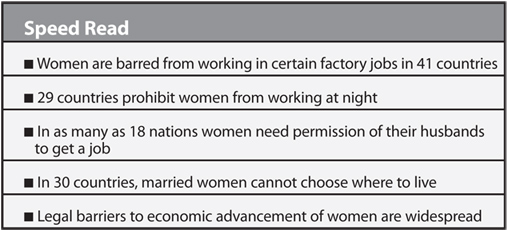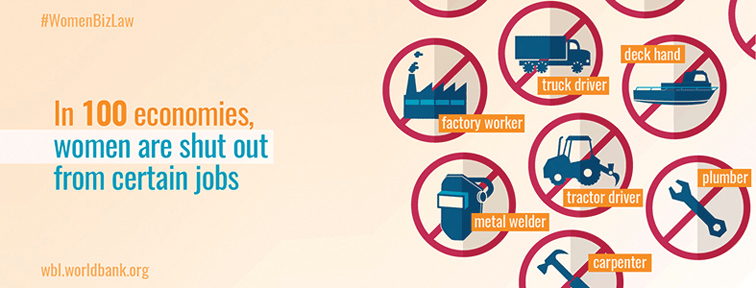Women
restrained
 World Bank Group’s Women, Business and the Law 2016 report finds
women in many South Asian countries need their husbands’ permission to
get jobs: World Bank Group’s Women, Business and the Law 2016 report finds
women in many South Asian countries need their husbands’ permission to
get jobs:
Women in South Asia continue to trail their peers in many other parts
of the world, as discriminatory laws thwart their economic advancement,
says the World Bank Group’s Women, Business and the Law 2016 report,
released on September 9. The report, published every two years, examines
laws that impede women’s employment and entrepreneurship in 173
economies throughout the world.
The 2016 edition expands coverage in South Asia from 5 to 8
economies, adding Afghanistan, Bhutan and the Maldives. Several
economies from the South Asia region are among the most restrictive in
the world in the dimensions measured affecting women’s entrepreneurship
and employment. The region as a whole has been lagging in enacting
reforms in the areas measured by the report, with only three reforms
made in two economies in the past two years.
Afghanistan
Afghanistan, which is one of the most restrictive economies in the
world, imposes more than 20 legal barriers to women’s economic
inclusion. The report finds that in Afghanistan, married women cannot
choose where to live, apply for a passport, or obtain a national ID card
in the same way as married men. Women also cannot work in the same jobs
as men.
India
In India, the region’s largest economy with 612 million women, job
restrictions remain widespread, with women not allowed to work in mining
or in jobs that require lifting weights above a certain threshold or
working with glass. The law also prohibits women from jobs ‘involving
danger to life, health or morals’.
In addition, there are no laws to protect women against sexual
harassment in public places, protections which exist in 18 other
economies around the world.
 In
the last two years, India undertook one reform in the areas monitored by
the report. By introducing a law mandating at least one female member on
the board of publicly listed companies, India became the only developing
country and one of only nine countries in the world to mandate female
inclusion on corporate boards. In
the last two years, India undertook one reform in the areas monitored by
the report. By introducing a law mandating at least one female member on
the board of publicly listed companies, India became the only developing
country and one of only nine countries in the world to mandate female
inclusion on corporate boards.
Pakistan
In Pakistan, many restrictions on women prevail. In order to register
a business, married women need to include their husband’s name,
nationality, and address – and they need to do this in the presence of a
witness. Women are also barred from working in many jobs, including
those in factories and in mining. And there are no laws guaranteeing
women equal remuneration for work of equal value and no laws mandating
non-discrimination based on gender in hiring.
However, Pakistan issued 2 reforms in the past two years. It set the
legal age of marriage for both boys and girls at 18 years and introduced
criminal sanctions for men who contract marriage with a minor and anyone
who performs, facilitates or permits underage marriage. Pakistan also
introduced a 22 percent quota for women in local government.
Sri Lanka
Legal discrimination, which can affect female labour force
participation, is also prevalent in Sri Lanka. Women are prohibited from
working in the mining sector and restricted from certain tasks/functions
in factories. Moreover, there are no laws against gender-based
discrimination in hiring or access to credit.
Bangladesh
 In
Bangladesh women face job restrictions such as working in certain
factory jobs or working in certain occupations, such as mining, and in
Nepal, women cannot confer citizenship to their children or to their
non-national spouse in the same way as men. This limits access to
government services for some of the county’s most marginalized children. In
Bangladesh women face job restrictions such as working in certain
factory jobs or working in certain occupations, such as mining, and in
Nepal, women cannot confer citizenship to their children or to their
non-national spouse in the same way as men. This limits access to
government services for some of the county’s most marginalized children.
Bhutan
And in Bhutan, according to the Companies Act, a woman director of a
company must include her husband’s name, address and nationality within
the company registry.
Women, Business and the Law measures how laws, regulations and
institutions differentiate between women and men in ways that may affect
women’s incentives or capacity to work or to set up and operate a
business.
It analyzes legal differences on the basis of gender in 173
economies, covering seven areas: accessing institutions, using property,
getting a job, providing incentives to work, building credit, going to
court and protecting women from violence.
(The report is
published every two years. The full report and accompanying datasets are
available at http://wbl.worldbank.org About Women, Business and the Law)
|
Women,
Business and the Law 2016:
FACT SHEET
The indicator on Getting a Job assesses
restrictions on women’s work, such as prohibitions on
working at night or in certain industries. This indicator
also covers laws on work-related maternity, paternity and
parental benefits. All the economies covered by Women,
Business and the Law have labour regulations that treat men
and women differently. Some of these differences may
facilitate women’s participation in the workforce, but many
prevent it.
Key Findings on this
Indicator:
* In 100 economies women face gender-based
job restrictions. Where this is the case, their income is
likely to be lower relative to men’s income.
*In the Russian Federation women are
prohibited from working in 456 specified jobs, including
driving a truck carrying agricultural produce, woodworking
and being a train driver.
* Women cannot work the same night hours
as men in 29 economies.
*Recently Belarus reduced the number of jobs prohibited to
women from 252 to 182.
* Jamaica lifted restrictions on women
working at night.
* Taiwan, China removed restrictions on women working in
mining, jobs deemed hazardous and jobs requiring
heavy-lifting.
* The average length of paid maternity
leave worldwide is 106 days, while the average length of
paid paternity leave is only 7 days.
* Papua New Guinea, Suriname, Tonga and
the United States are the only economies in the world that
do not legally establish paid leave that a mother can take
upon the birth of a child.
* In 51% of economies that establish paid
maternity leave, the government pays for maternity benefits.
* In a further 19%, the government and
employers share the payments.
* More economies are introducing paternity
leave. Recently Hong Kong SAR, China; the Islamic Republic
of Iran; Israel; the Lao People’s Democratic Republic and
Nicaragua introduced such leave. Parental leave is the least
common type of leave. Just under one-third of economies
provide for parental leave.
* 147 economies legally protect pregnant
women from dismissal in employment and 96 economies
guarantee mothers an equivalent position after maternity
leave.
* Only 71 economies mandate equal
remuneration for work of equal value and just 70 mandate
non-discrimination in hiring based on gender. Mauritius and
South Africa now mandate equal remuneration for work of
equal value.
* 45 economies establish gender
differences in the ages at which men and women can retire
and receive full benefits. Such differences can negatively
impact women by creating disparities in career prospects,
lifetime earnings, pension benefits and retirement savings.
*Albania, Kazakhstan, São Tomé and
Príncipe and Serbia passed legislation to remove gender
differences in retirement ages so that women can retire and
receive benefits at the same age as men.
Women, Business and the Law measures how
laws, regulations and institutions differentiate between
women and men in ways that may affect women’s incentives or
capacity to work or to set up and operate a business. It
analyzes legal differences on the basis of gender in 173
economies, covering seven areas: accessing institutions,
using property, getting a job, providing incentives to work,
building credit, going to court and protecting women from
violence. The report is published every two years.
|
|

